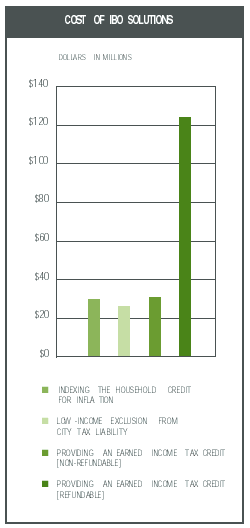|
The study evaluates three proposals to remedy this gap in the city's tax code and assesses their effectiveness in eliminating city personal income tax liability of households paying no state and federal tax. Any of the three could be implemented for approximately $30 million per year, although the cost of the most effective proposal-an Earned Income Tax Credit (EITC)-would grow to $125 million if the city chose to maximize work incentives by making the credit refundable. IBO's report concludes that a non-refundable EITC against city personal income tax liability, combined with a child care tax credit, would remove from the tax rolls virtually all of the 99,500 households now subject only to the city tax. Such credits already exist in the state and federal codes-indeed, the city's decision not to adjust the local tax upon the introduction and enhancement of these state and federal credits largely explains why the problem has grown so large. A city credit could be structured as a fixed percentage of the state EITC which itself is pegged to the federal credit. A city EITC linked to the state's credit would be very easy to administer and thanks to the inflation indexing built into the federal EITC, the tax relief would not erode over time. Earned income tax credits, and particularly refundable credits, provide low-income individuals with an incentive to increase their labor force participation. For some workers with very low income, the EITC exceeds pre-credit tax liability. With a refundable credit, these workers would receive a refund check for the difference between their EITC and liability. Making such work incentives as strong as possible would complement welfare reforms aimed at encouraging public assistance recipients to leave the rolls and enter the private labor force. |
 ecause the city tax code has not kept pace with federal and state policy, the city levies income taxes on more than a quarter of a million New Yorkers too poor to be taxed by the federal and state governments. A study by the Independent Budget Office showed that 99,500 working households, nearly three-quarters of which are headed by single parents, are affected by a city personal income tax whose credits for low-income households have not kept pace with either inflation or the federal and state earned income tax credits for the working poor.
ecause the city tax code has not kept pace with federal and state policy, the city levies income taxes on more than a quarter of a million New Yorkers too poor to be taxed by the federal and state governments. A study by the Independent Budget Office showed that 99,500 working households, nearly three-quarters of which are headed by single parents, are affected by a city personal income tax whose credits for low-income households have not kept pace with either inflation or the federal and state earned income tax credits for the working poor.
 Working poor households subject to city but not state or federal taxes are contributing $10.7 million to the city's coffers for tax year 1998, with tax payments averaging over $100 per family. "For families struggling to stay out of poverty, this city tax burden reduces the scarce funds available for food and other necessities and undermines the work incentives of the federal and state tax policies," explained IBO's George Sweeting, the primary author of the report.
Working poor households subject to city but not state or federal taxes are contributing $10.7 million to the city's coffers for tax year 1998, with tax payments averaging over $100 per family. "For families struggling to stay out of poverty, this city tax burden reduces the scarce funds available for food and other necessities and undermines the work incentives of the federal and state tax policies," explained IBO's George Sweeting, the primary author of the report.